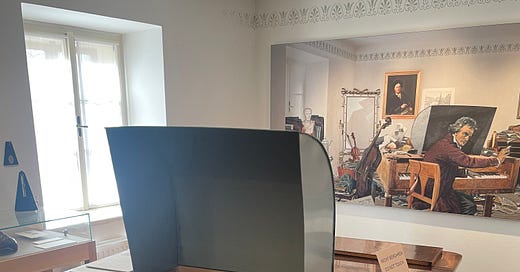Week 23: Unable To Hear Beethoven
One pianist's journey to perform the 32 piano sonatas of Beethoven.
Just beneath the keyboard of my worn baby grand Yamaha piano, on the left side, there’s a small handle, like the one on the cord of a lawnmower. I had no idea it was there for the first few years I owned this piano. I’d bought the instrument to use for practising in the small apartment I rented at the time. I’m not sure that even its previous owner knew about the handle, since he didn’t mention it to me when I answered his bulletin board ad. The first piano technician I hired didn’t notice it either.
When I began prepping Liszt’s bombastic “Wilde Jagd” etude for a faculty concert, the upstairs neighbours in my building dropped their initial pretense of enjoying my music. After various failed mediation attempts, they began incessantly calling the police. But every time an officer showed up at my door, he would start telling me about his own amateur music-making, ending up too friendly and polite to charge me. I guess that in our university town, they didn’t take the noise of one classical pianist seriously. The foiled and enraged neighbours began taking direct action, such as stereo wars, stomping on the floor, and screaming profanities. I finally decided it was time for home ownership, got a realtor, and made an offer on a house. Meanwhile, not knowing of my intentions, the neighbours moved out, furiously, in a pouring rain storm, a sight I’m now ashamed to say I quite enjoyed from behind the living room curtains.
Once I had mortgaged my life and finished the move to my new home, I hired a different technician to come and check over the piano. This technician discovered the little handle and demonstrated to me what it did. When you pull on it, a very thick strip of felt is moved in between the hammers and the strings, muting the piano by about 90%.
Oh.
I’ve kept this otherwise boring piano longer than I intended simply because this rare feature is very useful. Lately, some changes in my life mean I’m having to use it most of the time. Ironically, at this point in my Beethoven journey I’m practising his loudest, most unruly, noisy, and defiant sonata – the “Hammerklavier” sonata Opus 106.
I have an option that he didn’t, which is to practise with headphones on my electric stage piano. Sometimes I do. But while such instruments may claim to be “touch-sensitive”, they do not have an analog, acoustic touch. The touch is different in kind. For some music that’s perfectly fine, but it doesn’t work for this project. Beethoven wanted to embed the way it would physically feel to play his music into the core structure of his sonata architecture. That is why he kept composing at the piano no matter how deaf he was.
Practising this music on a muted piano has made me feel frustrated, emotionally outraged, and anxious about the upcoming concert. Can I possibly adequately prepare something I can’t hear?
So preoccupied have I been with all the egotistical feels the situation is giving me that I have only gradually begun to notice, through my audio fog, that I am in this space with Beethoven.
Beethoven heard this music in the same way I am now hearing it. I have good evidence, because at the Beethoven museum I visited in Vienna, there were headphone audio displays of how much he could hear at different stages of his deafness. The audio level I’m hearing now corresponds to the one he heard at the age he wrote the “Hammerklavier” sonata
There’s a marvellous article in the New York Times by Gabriela Lena Frank, a composer with hearing loss. She thinks Beethoven’s deafness is encoded in the music. For instance, it’s a fact that the strategy of writing very high tones for the right hand and very low ones for the left hand, as he often does in the “Hammerklavier” sonata, makes them more audible. I am now able to listen for that.
https://www.nytimes.com/2020/12/27/arts/music/beethoven-hearing-loss-deafness.html
I’m tempted to give my next concert on my muted piano, so that others can experience this. I’m held back, though, by another phenomenon that Frank mentions: the tendency to feel more introverted when one can’t hear as well.
The slow movement of the “Hammerklavier” sonata invokes grief. That I remember, from having performed it years ago. But now, when I play it on muted piano, the process of straining to hear it draws me down the deep mineshaft of its profound tragedy. To be honest, I have a fear of things becoming unbearable.
What would Beethoven want? For us to hear the strain, or to hear his vision fully? But the other question is, what do we want? What kind of truth do we want to hear, in a time when “truthiness” is all we are conditioned to accept?
Hesitant at the threshold of Beethoven’s vision, I can already glimpse that his deafness, in closing a door to his human world, opened another. Perhaps our lives today have something in common with Beethoven, in that by carefully curating our own personal bubbles, we too have closed the door to the type of analog human world Beethoven lived in. But our own resulting deafness is not a tool for exploration but rather for personal safety. We’re aware that we are already further down the path towards our civilization’s fate than was T.S. Eliot when he listened to Beethoven’s late music, then wrote in Four Quartets:
“Go, go, go, said the bird: human kind
Cannot bear very much reality.”



This whole written piece is probably the best 'thing' I have read so far on Substack. Thank you so very much for taking the time to write it. I am very new to the piano but I play daily so that I can sing. ❤️ your friend Lizzie
Is that really Beethoven's Plano?